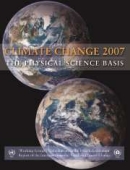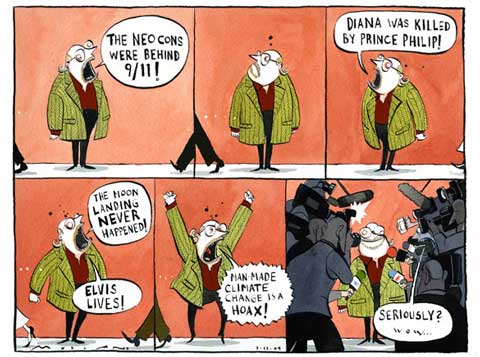 Plimer’s bronzed body arced through the brutal Brisbane air and knifed into the pool with a barely perceptible splash — no belly flops for the silver-haired Adonis of climate scepticism. Monckton, in solar topee and camouflage Army & Navy shorts, clutched his glass of gin & tonic and tried to repress boarding school thoughts. He glanced over at Lady Monckton, deep in her Jilly Cooper and even deeper into a bottle of Queensland chardonnay, oblivious. It was a Hockney scene, the Laird thought, bar the gaudy birds screeching loudly in the trees. Or was that the other guests? He shuddered. Australia really was a fatal shore.
Plimer’s bronzed body arced through the brutal Brisbane air and knifed into the pool with a barely perceptible splash — no belly flops for the silver-haired Adonis of climate scepticism. Monckton, in solar topee and camouflage Army & Navy shorts, clutched his glass of gin & tonic and tried to repress boarding school thoughts. He glanced over at Lady Monckton, deep in her Jilly Cooper and even deeper into a bottle of Queensland chardonnay, oblivious. It was a Hockney scene, the Laird thought, bar the gaudy birds screeching loudly in the trees. Or was that the other guests? He shuddered. Australia really was a fatal shore.
Old Scrotum, Monckton’s wrinkled retainer, sat under an umbrella with a drinks trolley at his side, ready to deliver refills and ice as required. After the first hectic days of the Laird’s great Australian adventure a little peace and quiet was welcome. Plimer was cavorting in the sun, demonstrating that Australian knack for healthy activity that had bred a nation of Shane Warnes. As his august head popped out of the water, Plimer shook his lengthy silver locks, scattering water like a labrador in a paddling pool, his large brown eyes focussed firmly on the Laird. Scrotum was watching the dynamic developing between the two new stars of the denialist southern cross. On stage they were undeniably effective, Plimer galloping Gish-like through a hundred objections to climate science, while Monckton invented polar bear statistics, miscalculated climate sensitivity, and preened in the adoring attention of the elderly audiences. Was there something emerging from the laird’s past, something Scrotum had never seen? He scratched his ear, sipped at his water, and furrowed his brow.
“G’day, you bastards!” Peace fled up towards the cockatoos in the trees, who objected loudly as Carter strode across the hot tiles, a six pack of XXXX clutched under one arm, the other waving a cork-fringed hat. On stage and in public Carter was a mild-mannered, well spoken man, but in private and when he let his hair down (which he did with great vigour and frequency), he adopted a demeanour reminiscent of Crocodile Dundee.
“Chris, this hat’s for you. I know how much you like a hat. This’ll keep the flies at bay,” Carter boomed. The cockatoos hushed respectfully, but a fruit bat lolloped away in disgust. Lady Monckton pulled her hat down over her eyes.
The Laird lifted his aviator sunglasses (with leather blinkers), and smiled faintly. “Bob, good to see you. How was the drilling?”
“Great. Got a bloody long core — world record, somebody said. Should allow us to track sea level changes off New Zealand for the last 35 million years. That’ll show them there’s nothing to worry about this century — it’s all happened before, so it can’t be our fault.” Scrotum noted the glint in Carter’s eyes, a fanatical flash of pinhole pupil that would have worried anyone not familiar with the inner circles of climate inactivism.
Carter stretched out on the lounger next to the Laird, and Plimer pranced over to join them. The gentle susurration of tinnies being cracked filled the air. Scrotum went over to the barbie and lit the gas. It would soon be time for jumbo prawns.
****
The flight to Adelaide was a nightmare. The Laird’s insistence on carrying his childhood talisman in hand luggage — a stuffed champion racing guinea pig left him by his father — had caused more than raised eyebrows at airport security. They’d had to x-ray it twice, and remove its underpants before it was allowed on board. Then the Aussie academic they’d debated in Brisbane, the one with the shiny pate and fixation on nuclear power had been seated right behind the Laird. As soon as the plane was in the air, he’d started picking away at Monckton, questioning his calculations on climate. He even had the bad taste to mention Curry and Clow. Plimer — a colleague at the University of Woolloomooloo — had to intervene to prevent fisticuffs. For the remainder of the flight, the Moncktons had to dodge peanuts the Aussie was flicking over the seat backs. Scrotum, deep in a tape of Michael Mann’s greatest hits on his ancient Sony Walkman, could only smile.
****
Plimer insisted they stay at his country estate, only an hour or two from Adelaide by light aircraft. The Laird had not been keen, but Plimer had been insistent, and the good Lady M didn’t object, so they went. Scrotum wasn’t pleased. There was no room for the Laird’s eleven battered suitcases in the Cessna, so he had been instructed to ensure their safe arrival. Ten hours overland in an ancient Landrover without air conditioning was not Scrotum’s idea of an Australian holiday, still less when the driver looked like Dame Edna’s effeminate brother but lacked the great woman’s charm.
Scrotum seldom swore, but as the short wheelbase Defender bounced over yet another fallen gum branch, the wrinkled retainer’s equilibrium was finally disturbed. “Stop this bloody thing, will you!”
The driver spat out of the window and did as he was told. Scrotum opened the door, jumped out onto the dusty track and started stretching. After a moment of stationary bliss, he lowered his eyes from the great blue sky overhead and noticed he was being watched. Several large kangaroos were approaching the Landrover. One was licking its lips, and its long tail was beating the ground with obvious intent. On the other side of the track, a group of koalas were clambering slowly down out of the eucalypts. He looked down at his feet, and jumped backwards. A very large lizard was flicking its tongue at his shoes. A kookaburra laughed to see such fun, but Scrotum was back in the car before Matilda could have taken a single waltz step.
****
Dundiggin’ lacked the crenellations of Tannochbrae Manor, but was undeniably well-situated. A small hobby mine in the back garden produced gems of sufficient quality to keep Plimer in tailored shirts and shiraz. The view of the dusty hills towards the interior of the great dry continent was stunning, but the swimming pool was empty and the air-conditioning restricted to large fans that creaked alarmingly over the beds. Monckton had nearly fainted when, during a break in the long and drunken welcome barbie, he’d relieved in himself in the dunnie and found he was being watched from the bowl by a little green frog. He insisted that Scrotum take the sheets off his bed to ensure there were no nasty surprises for his good Lady. There was a rather long centipede, but nothing poisonous.
In the small tin shed under the water tank at the side of the main house, Scrotum stared at the ceiling and gave the geckos names. Mycroft had warned him it would be warm, but this was ridiculous. It was going to be a long night.
****
The early morning heat was breathtaking. Plimer insisted this was normal for summer, but the radio was warning of extreme heatwave conditions and catastrophic fire danger for most of South Australia. Monckton thanked the lord (the other one, obviously) for his solar topee and tucked into his breakfast with vigour. Lady M misted herself with lavender water and stayed in the shade. They had a day to kill before getting the show back on the road in Adelaide with three Probus Club sessions and an evening debate at the Retired Cricketer’s Association club rooms in McLaren Vale. Plimer wanted to take the Laird out into the bush “to get a feel for the place”.
“Do we have to, Ian? It’s bloody hot, y’know. Not at all the sort of thing I’m used to. Scotch mist, yes. Occasional snow, of course, but this is a different planet.” Monckton didn’t sound keen.
“Don’t be a wowser, Chris. You can bring old Scrote along to carry the water, make lunch and frighten the flies.” Scrotum shuddered.
****
Plimer drove a slightly newer Landrover than Scrotum had ridden in the day before, but it was just as crusted in dust and scarred by hard use on rough roads. The back was full of the tools of a geologist: hammers of all sizes, two shovels, and an esky full of beer. Plimer swung himself up into the driver’s seat, but Monckton was nowhere to be seen. “Chris!” he yelled. “Get your arse in gear.”
“Won’t be long.” Monckton’s muffled voice was coming from the house. In the guest bedroom he was struggling with his new body armour. He’d tested it with the razor-sharp koala claws he kept in the library at Tannochbrae for defacing Nature, and it was definitely better than the stuff he’d had in Copenhagen. He had no intention of ending up naked wrapped around a statue of a mermaid again.
In the tin shed, Scrotum stuffed the satellite phone back into his rucksack, strapped Mycroft’s GPS watch to his wrist, and headed for the kitchen to pick up the Laird’s picnic lunch — cucumber and potted shrimp sandwiches. Plimer was planning to barbecue sausages on the bonnet of the Landrover, but Scrotum doubted that Monckton would go for that.
****
Plimer drove like a man possessed, but it wasn’t entirely clear what was possessing him. Monckton feared it was some terrible antipodean madness, a consequence of too much sun, breathing dust from birth, and compulsory leg spin lessons at kindergarten, but Scrotum suspected something rather more schoolboy — a desperate desire to convince his new best friend that he was really a man’s man. As that man’s man’s friend’s man, Scrotum feared he’d seen something like it before, when the Laird had tried a similar tactic with Dennis Thatcher. Quite why he had thought he could drink Margaret’s consort under the Number Ten table, and why he had thought it might be a good idea in the first place remained a mystery, but the redoubtable liver of Mr Thatcher had been more than a match for the young Laird. It had taken Scrotum the best part of a day to get the diced carrots out of the deep blue shagpile.
****
They took lunch in the dappled shade provided by a grove of coolibah trees. The only birdlife they’d seen for miles had been an occasional cockatoo. Monckton asked rather nervously about birds of prey, but Plimer laughed. “Still worried about eagles, eh Chris? We’ve got a few hawks, but nothing that would dent your hat. Relax, out here nothing can go wrong.”
The two gentlemen scientists reclined on the picnic rug sharing a bottle of chilled Adelaide Entre Deux Legs and fell to discussing the weighty matter of climate sensitivity. Monckton, moved by the heat and the intensely alcoholic golden brew, began a lengthy peroration. Scrotum excused himself, and went for a walk. Once on the far side of the trees, he tapped a button on his watch and switched on the satellite phone.
“Scrotum to Wollumboola Base. Come in Wollumboola Base.” Flannery was obviously sleeping off a long lunch, because it took him a minute or two to answer. Once awake, though, the great Australian was brisk and business-like. “You’ll need to keep the bastards there for 15 minutes, Scrotum, can you manage that?”
“I believe I can, sir, I believe I can.” He trotted back to the car and unloaded another bottle of wine and a box of chocolate-dipped yabbies. The Laird had become deeply enamoured of the strange confection. “As great a contribution to the world as Clarrie Grimmett’s flipper” he told Plimer as he chomped.
****
“What’s this place called, Ian?”
“The local people call it Hanging Sock. No idea why. Some kind of Christmas cargo cult perhaps?”
The air was still, the heat oppressive, the silence absolute until an unearthly throbbing ululation began in the trees. Monckton sat bolt upright, a yabbie clinging tenaciously to his lip. Plimer’s sang froid seemed to desert him. Scrotum retreated to the Landrover and watched as a small band of the local people emerged from the scrub, their faces painted in strange pointilliste patterns, spears pointing at the two men on the rug. They halted and stood motionless as the didgeridoo chorus grew louder. A cloud of dust appeared on the low ridge in front of the car, and it seemed to be approaching at great pace.
Monckton was shivering. Plimer tried to assert himself. “Look mate, it’s just the local people giving us a cultural welcome. Strange lot, but there’s not a bad bone in their bodies. Just don’t flinch. That’s an insult.”
By now, it was obvious that the dust was being raised by a mob of large grey kangaroos. Scrotum thought the one in front looked familiar, only this time it was wearing boxing gloves. Several large lizards scampered along in the marsupial vanguard, and out of the coolibah trees a crack squad of hit and run koalas were making a flanking movement. Scrotum locked the car doors and pretended to be deep in a book.
Plimer stood up and walked towards the tribesmen. They stared impassively at him, showing no sign of listening to his cheery greetings and offers of beer. Monckton tried to stay close, but the lead kangaroo got in the way and biffed him on the head.
“You rotter! You scoundrel! You cad!” Monckton was incandescent with rage, and there being no eagles in sight, he tried a secret move his father had shown him during the hamster hunts of his childhood. If he could only clap both hands over the kangaroos ears at the same instant, the bugger’s eardrums would explode and that would be that. He missed. The kangaroo didn’t. Monckton went down in a flail of leathery tails and flying fists. The last thing Scrotum saw was a bunch of evil-looking koalas trussing both men.
The didgeridoos fell silent, and the dust began to settle. All signs of activity disappeared along with the men. Hanging Sock was deserted, Scrotum alone in the car with his thoughts. What would would Lady M say when he returned alone? Would she even notice? Would the Laird make his first Probus gig in the morning?
Perhaps not.
[Some translation may be necessary for those not familiar with the cultural and linguistic histories of Australia and its former colonial masters, hints available here. No marsupials were harmed in the telling of this story. Clarrie Grimmett is just one more in a long line of New Zealanders who were adopted as Australian because they were good at something. For connoisseurs of spin bowling, I recommend following the link under Shane Warne.]
This is the fourth Monckton tale.
Previous episodes:
- Monckton & The Case Of The Missing Curry,
- Mycroft Monckton Makes Mischief,
- Something Potty In The State Of Denmark.
Like this:
Like Loading...
 The campaign by the NZ Climate “Science” Coalition and Richard Treadgold’s “Climate Conversation Group” to cast doubt on the NZ temperature record and to smear the scientists who have worked on it has stepped up a notch or two in recent days, following a response by NIWA to an Official Information Act request from NZ C”S”C secretary Terry Dunleavy. It seems Dunleavy and Treadgold didn’t like the answers they were given, because they immediately jumped on one small part of the response, and rushed out a press release throwing up their hands in in horror. Here’s Dunleavy:
The campaign by the NZ Climate “Science” Coalition and Richard Treadgold’s “Climate Conversation Group” to cast doubt on the NZ temperature record and to smear the scientists who have worked on it has stepped up a notch or two in recent days, following a response by NIWA to an Official Information Act request from NZ C”S”C secretary Terry Dunleavy. It seems Dunleavy and Treadgold didn’t like the answers they were given, because they immediately jumped on one small part of the response, and rushed out a press release throwing up their hands in in horror. Here’s Dunleavy:
 When I was writing the
When I was writing the 
